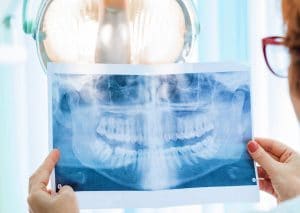 Periodontal disease, or gum disease, is highly preventable, and when it does develop, it can be successfully managed before it causes severe trouble for your oral health. Yet, despite this, severe periodontal disease remains a significant threat to many people, and is one of the most frequent causes behind adult tooth loss. The difference between managing minor periodontal disease and recovering from more severe periodontitis is time. If you don’t seek treatment and ongoing maintenance for your periodontal disease, it will almost certainly progress into more severe periodontitis by the time you do.
Periodontal disease, or gum disease, is highly preventable, and when it does develop, it can be successfully managed before it causes severe trouble for your oral health. Yet, despite this, severe periodontal disease remains a significant threat to many people, and is one of the most frequent causes behind adult tooth loss. The difference between managing minor periodontal disease and recovering from more severe periodontitis is time. If you don’t seek treatment and ongoing maintenance for your periodontal disease, it will almost certainly progress into more severe periodontitis by the time you do.
The formation of gingivitis
Before periodontitis becomes a severe threat or leads to the loss of one or more teeth, it starts a condition known as gingivitis, or gum infection caused by harmful oral bacteria. When enough oral bacteria accumulate along your gum line, they can irritate the tissues into separating from your tooth structures (a process known as gum recession). This can allow oral bacteria to settle underneath your gums, leading to infection and unchecked inflammation in the tissues. While the symptoms may seem minor at first, they can quickly become more severe and cause more damage to your gums over time.
As your periodontal health worsens
As periodontal disease progresses, what starts as minor inflammation and irritation becomes more severe, chronic inflammation and substantial tissue damage. As the disease continues to erode these tissues, it can eventually affect the underlying bone structure of the dental ridge, particularly in areas that surrounding and support your teeth roots. This degradation leaves one or more of your teeth loose and without adequate support, potentially leading to tooth loss before long. In addition, the unchecked inflammation that grows in your periodontal tissues can also have a longer-term impact on your overall systemic health and wellbeing.
Managing periodontal disease’s progression
If you exhibit signs of gingivitis or gum disease, even if they appear minor, it’s important to seek appropriate treatment for it as soon as possible. When detected and treated early, gingivitis may be successfully addressed with the help of periodontal cleaning, or scaling and root planing. This involves removing the bacteria from your teeth roots, underneath your gums, before the gum infection has a chance to progress any further. For more severe cases of periodontal disease, you may also require ongoing maintenance to ensure that your periodontal disease remains under control and doesn’t lead to more extensive concerns.
Learn how to stop periodontal disease
The progression of periodontal disease could cause several other consequences for your oral health, which makes properly managing it that much more important. For more information, schedule a consultation with Dr. Kania by calling her periodontal office in Encinitas/San Diego, CA, at (760) 642-0711.



